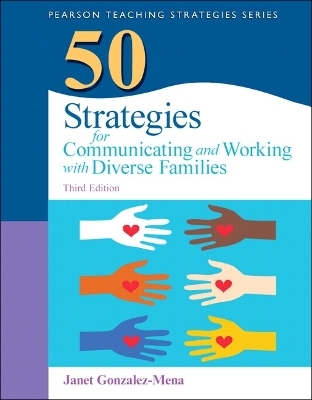
50 Strategies for Communicating and Working with Diverse Families
Pearson (Verlag)
978-0-13-309027-7 (ISBN)
Janet Gonzalez-Mena is Retired Faculty in Child and Family Studies, Napa Valley College, Napa California, where for 15 years she was on the full-time faculty until her retirement in 1998. Not only has she taught in the California community college system for 36 years, but also Gonzalez-Mena’s career includes being a preschool teacher in a bilingual program, child care director, and coordinator of a pilot program of therapeutic child care for abused and neglected children. A prolific author, her textbook achievements include: Child, Family, and Community, 6th ed. (Pearson, 2013); Infants, Toddlers and Caregivers, 9th ed. (McGraw-Hill, 2012); Foundations of Early Childhood Education: Teaching Children in a Diverse Society, 6th ed., (McGraw-Hill, forthcoming); and Diversity in Early Care and Education: Honoring Differences, 4th ed. (National Association for the Education of Young Children, 2008). Janet also co-authored Basics of Developmentally Appropriate Practice: An Introduction for Teachers of Infants and Toddlers (National Association for Education of Young Children, 2011). Currently self-employed as a consultant in early care and education, she also finds the time to write for Young Children and Exchange, and occasionally for publications in Canada and New Zealand.
Section 1: Welcoming Everybody
Chapter 1: Appreciating All Kinds of Families
Chapter 2: Working with Immigrant Families
Chapter 3: Including Families of Children with Special Needs
Chapter 4: Creating an Antibias Environment
Chapter 5: Respecting All Families, Including Those with Same-Sex Parents
Section 2: Partnerships with Families
Chapter 6: Building Partnerships
Chapter 7: Removing Barriers to Partnerships
Chapter 8: Minimizing Competition with Parents
Chapter 9: Supporting Attachments
Chapter 10: Considering Authority
Chapter 11: Focusing on Family Strengths
Chapter 12: Helping Parents to Be Advocates for Their Children
Chapter 13: Encouraging Parents to Become Advocates for All Children
Chapter 14: Creating a Sense of Community
Section 3: Honoring and Working with Diversity
Chapter 15: Understanding and Appreciating Cultural Differences
Chapter 16: Establishing Culturally Responsive Education and Care
Chapter 17: Working with Conflicts Around Education and Care Practices
Chapter 18: Considering Cultural Differences in Guidance and Discipline
Chapter 19: Working with Families Around What You Believe Are Harmful Practices
Chapter 20: Thinking about Differing Ideas Related to How Children Learn
Chapter 21: Managing Conflicts
Section 4: Family Participation and Education
Chapter 22: Considering Family Participation
Chapter 23: Including Families in the Classroom or Center
Chapter 24: Focusing on Fathers and Grandfathers
Chapter 25: Taking a Transformative Approach to Parent Education
Chapter 26: Working With Families Around Holiday Issues
Chapter 27: Exploring Parents' Role on Decision-Making Boards and Councils
Section 5: Communication
Chapter 28: Creating Environments for Communication
Chapter 29: Empowering Self and Others
Chapter 30: Communicating Through Writing
Chapter 31: Holding Ongoing Conversations with Families
Chapter 32: Looking at Nonverbal Communication Across Cultures
Section 6: Meetings and Conferences
Chapter 33: Meeting with Families for the First Time
Chapter 34: Thinking About Meetings in General
Chapter 35: Holding Conferences
Chapter 36: Considering Cross-Cultural Conferences
Chapter 37: Talking with Families when Concerns Arise
Section 7: Working with Parents around Specific Issues
Chapter 38: Helping teh Child Enter the School or Program
Chapter 39: Maintaining Home Languages
Chapter 40: Easing Children Through Transitions
Chapter 41: Brining Nature into Children's Lives
Chapter 42: Addressing Obesity with Nutrition
Chapter 43: Dealing with Media Issues
Chapter 44: Maintaining Stability During Divorce
Chapter 45: Coping with a Death in the Family
Chapter 46: Finding Community Resources and Making Referrals
Section 8: Challenging Conversations
Chapter 47: Working with Parents Who Constantly Complain
Chapter 48: Working with Family Members Who Appear Hostile
Chapter 49: Talking with Families About Behavior Changes
Chapter 50: Referring Families for Abuse or Neglect
| Erscheint lt. Verlag | 28.1.2013 |
|---|---|
| Reihe/Serie | Practical Resources in ECE |
| Sprache | englisch |
| Maße | 100 x 100 mm |
| Gewicht | 100 g |
| Themenwelt | Kinder- / Jugendbuch ► Sachbücher |
| Sozialwissenschaften ► Pädagogik ► Berufspädagogik | |
| Sozialwissenschaften ► Pädagogik ► Sozialpädagogik | |
| Sozialwissenschaften ► Soziologie | |
| ISBN-10 | 0-13-309027-2 / 0133090272 |
| ISBN-13 | 978-0-13-309027-7 / 9780133090277 |
| Zustand | Neuware |
| Informationen gemäß Produktsicherheitsverordnung (GPSR) | |
| Haben Sie eine Frage zum Produkt? |
aus dem Bereich


